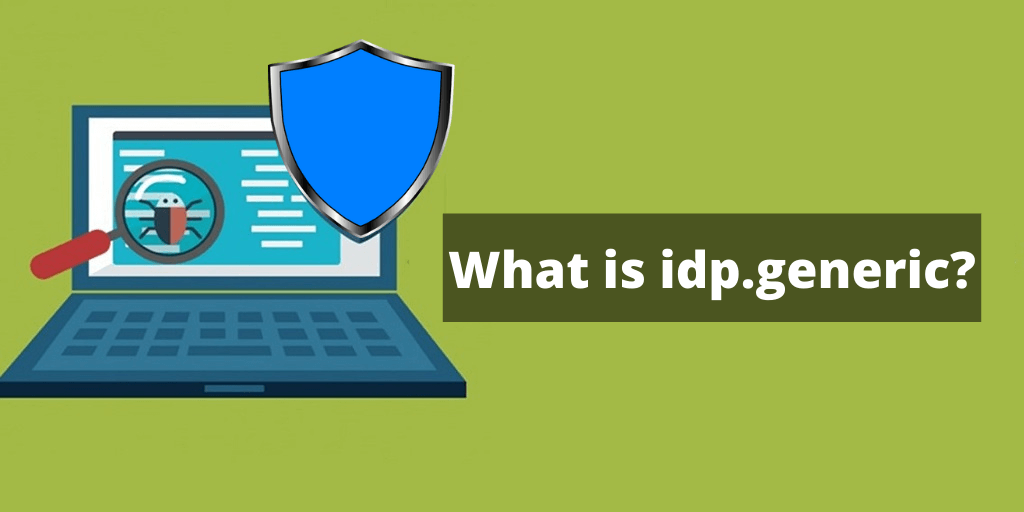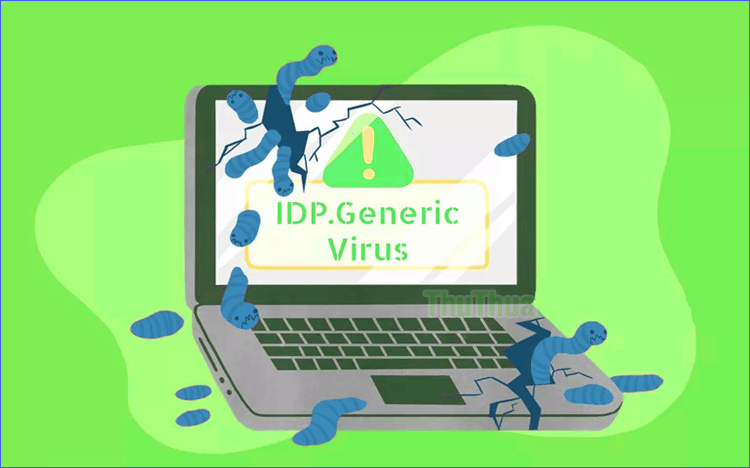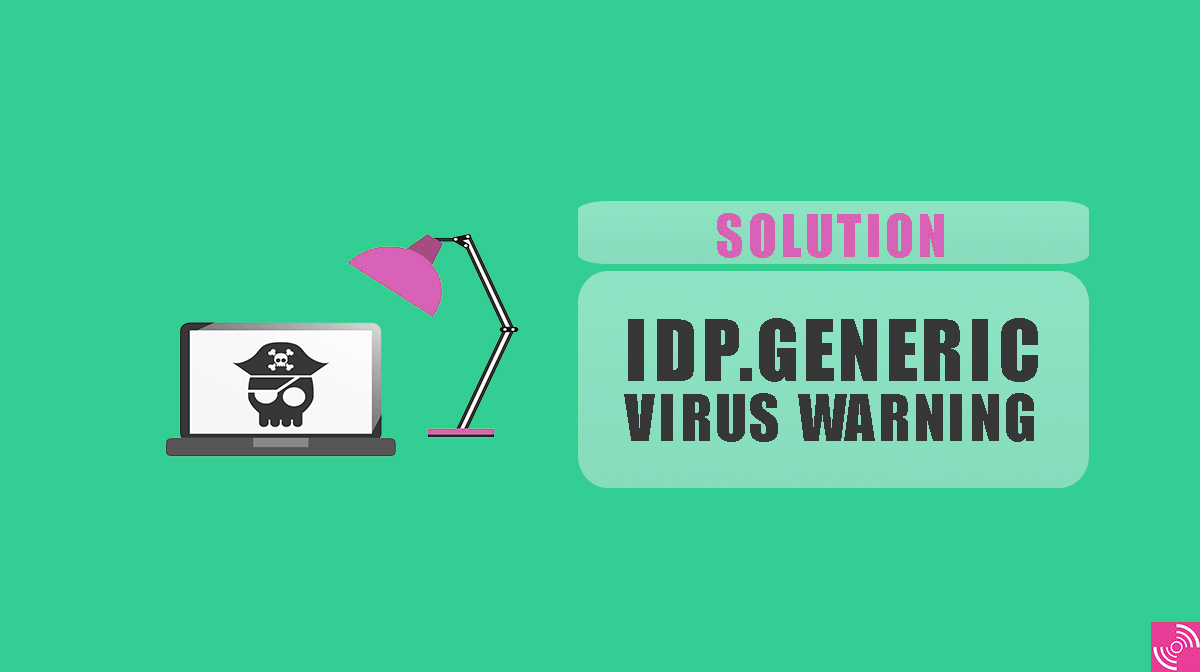As you may know, a new virus has been making the rounds. The IDP.Generic virus is a particularly nasty one, as it infects your computer and forces it to download more malware immediately after infection. If you receive an email with an attachment from someone you know but aren’t expecting something from, be on guard! The best way to protect yourself against this and other viruses is to make sure that your computer’s anti-virus software is up to date before receiving any emails or opening any attachments.
Contents
1. What is the IDP.Generic virus?
The IDP.Generic virus is a fake alert that claims to come from a company called Internet Data Protect (IDP) and claims that your computer has been infected. The virus will look like a pop-up or a full-page ad that will state that your computer has been infected with a virus and they can fix it for you. The IDP.Generic virus is a type of content virus, which means that it is constantly changing to avoid being detected.
As founder and CTO of Maximum Security Software, Dan Bejarano, says: This warning is very similar to a “scareware” ad, that some people believe trickles down to their mobile devices. In both cases, it is a tactic used to separate the person from the money. The IDP.Generic virus is sending mixed messages and presents as harmless. This is a computer virus and anyone who receives such an email should immediately stop clicking on any links in the message. However, even though the warning claims that you need to download a software package to make your PC safe, in fact the downloaded popup is nothing more than a pop-up ad. Another warning related to the IDP.Generic virus is that an ad may pop up claiming to come from a trusted source.
This virus sends a message and downloads and installs spyware and adware that have nothing to do with the security warnings and in fact are unrelated to the virus. Ask your IT security team about the legitimacy of this article and other related ads and websites. These are just two of the many types of misleading advertisements that are currently out there. In general, products or companies will not take responsibility or liability for fake advertisements, as they are completely innocent.
At most, you should report all fake advertisements and help guard against the spread of harmful content. The danger with any software and service is that it may be of questionable legitimacy. In many scenarios, only a customer service representative can tell you for sure whether a company is legitimate or not.
2. IDP.Generic, How does it infect your computer?
The infection usually happens when you click on a link in an email. That link might look like it’s taking you to a legitimate website but it might be a fake that takes you to a website that installs the virus on your computer. As you wouldn’t want to click on any link in an email if you have genuine intentions, don’t click on a link in an email attachment (especially one with malware embedded)! Malware often masquerades as legitimate software that will download and install a piece of malware on your computer. Fortunately, your anti-malware program will spot this type of malware very easily.
If you get an email with a link to a piece of software and the attachment loads a fake page that installs malware, the quarantine settings in your anti-malware program will remove (or quarantine) the link, preventing you from being infected. If you get an email with a link to a site where a piece of malware has been uploaded but it just loads a fake page instead of installing the malware, you shouldn’t open that email. Expect to receive many, many more emails like this in the future as the situation becomes increasingly out-of-hand. Carefully review any email you receive and make sure you stop clicking on links in emails.
3. How do you get rid of it? IDP.Generic
Ask any dermatologist and they’ll tell you that sunscreen is the most important thing you can do to prevent skin cancer. They might also mention that wearing sunglasses is a good idea, but don’t wear them if they make you feel like crying. Find a sunscreen that doesn’t leave a white cast on your skin and use it every day. Also, don’t underestimate the power of sun protection. If you get sun, wear something light and, even better, cover your entire body from hair to your shoulders.
Otherwise, you may burn and peel even when there isn’t any sun coverage on your body. If you’re a prospective father or a man who’s had cohabitating with his girlfriend for less than a year, use protection that stops sperm from reaching the egg before it hatches.
And if you’re a woman who wants to become pregnant, consider wearing a cervical cap. Cervical caps will prevent sperm and other debris from reaching the egg before it hatches. When it comes to looking young and fresh, a washcloth is a great way to pamper yourself both physically and mentally. Washing your hands often will give you the perfect amount of time to breathe and ease aches. If you’re thinking about bringing your dog to the beach or any other public place or have already done it, completely avoid bringing a food bowl.
Dogs love to steal, chew up, and ingest anything that they find. Food bowls, when properly secured, can be a dangerous situation for your dog. Think twice before bringing any food or treats into a public place. What better way to stay hydrated than with a gel or gel refill? These hydrating gels are easy to drink right out of the bottle. And, since you’ll be immersed in water constantly, these gels will not only make you feel hydrated but will help you to cleanse your skin as well. Tech chewers know that stuffing something up your nose and blowing onto it can bring a smile to your face.
4. What should you do if you receive an email with an attached file from a friend, family member, or business partner?
You should open the file and confirm that it is not malicious before you open it. You can do this by scanning the file for viruses or opening the file in a sandbox environment (a virtual environment where you can safely try out any file or piece of software without the risk of infecting your computer).You can learn a lot more about sandboxing in this article. Malwarebytes Anti-Virus Free version does not have built-in sandboxing, unlike the Premium version that we previously described.
As a result, opening file attachments in the Anti-Virus Free version is somewhat risky. Your best option to avoid malware infecting your computer is to refrain from opening unnecessary files such as those with attachments. I usually save all my PDF documents to my Desktop or Documents folder and do not open them from other applications or external devices. I sometimes open PDF documents from websites, especially when the document description and/or the PDF file name appear under a search bar.
However, you can also maximize your chance of not getting infected by not opening documents containing adware by adding a shortcut to the PDF file to the desktop. Then you are viewing the PDF document on your desktop rather than depending on your home page or another website to load a PDF file for you. As for PowerPoint presentations, you can save your Work’s saved PPT, PPTX, or PPT files to a different folder on your computer (such as the desktop) and not open them from your browser.
Since PowerPoint does not save video files, you will not have to worry about opening them from other applications as with PDF documents. The practice of downloading a PDF, PPT, or any other file attachment from a scam site and clicking to open it has become quite popular on social media. I have learned that downloading malicious files from scams including PDFs is never a good idea. If you must accept a PDF attachment that you received in error from a scammer, use the option to check for viruses first.
5. What should you do if you receive an email with a suspicious attached file from someone in your address Book. That may not be a friend, family member, or business partner?
The best thing to do if you receive an email with a suspicious attached file from someone in your address book. That may not be a friend, family member, or business partner is to forward it to your IT department so they can investigate. They will be able to tell you if the file is safe or if it’s harmful. While you may not realize it, the quarantine that the CDC has ordered is a great time to make sure that you have up-to-date anti-virus protection on your computer.
I’ve never had a computer that was remotely infected by ransomware as I have experienced with my iPhone and iPad. But here at Cornell Tech, we’d rather not worry about it life-saving our lives, so I can understand that. What we do know, however, is that 16% of college students lost access to their campus computer labs and all of their money via ransomware attacks in the 2018–2019 school year. That’s a huge blow to our campus, regardless of when the attacks took place. I regret to say that since March, I have been having to manually input my username and passwords on my computer after my email address has been compromised.
Why Use VPN: IDP.Generic
That process has been extremely slow, frustrating, and time-consuming. So I will be happy to use a VPN to hopefully be able to get back online as soon as possible. Thankfully, there are a few VPN tools you can use if you would rather not use the stickiness of a VPN. If you’re already using a VPN service, the next couple of questions may assist you in choosing a better option.
But they are well worth the answer, since they will decide what isn’t a guarantee. VPNs allow you to switch between a censored and unfiltered internet. And are generally better when it comes to protecting your privacy than your internet service provider (ISP). Most VPNs also have software you can use to customize your browsing experience, not just encrypt your information. VPNs work by routing user-provided traffic through different servers, and the server that’s used will vary based on the service.






